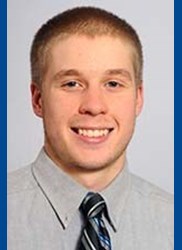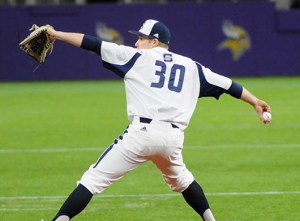After finishing up my student teaching placement and having time to reflect on all the challenges, accomplishments, peaks and valleys, I realized never to judge something before you get the chance to experience it. When I found out that I would be doing one of my student teaching placements in a four-year-old kindergarten classroom, I immediately had mixed emotions. While I hadn’t had much experience working with this age group, I was excited to continue my growth in education and become a better all-around future educator. I learned that it is okay to make mistakes, the importance of building relationships to help maximize the students learning potential and create a community like environment, and I learned that this is really the career for me.
One thing that I found very important while experiencing student teaching was to embrace any challenge or adversity that hits. After playing sports my whole life, I grew up listening to coaches talk about adversity and how it happens. They say that someone can judge another not based on the adversity in their life or circumstance, but how they handle it and how they either break through and become stronger or crumble in failure.
Everyday I faced challenges. One of the biggest challenges that I faced while at my placement was executing a head week. A week where I, the student teacher, was in-charge of the classroom activities and planning/executing lessons throughout the week. Adversity struck many times during my head week. My computer with all my lesson plans crashed and I was left with minimal materials to go off, the students were stuck with indoor recess all week due to unfortunate weather, and I was not feeling up to par. While I could go on about all my head week “fails” as my cooperating teacher calls them, I had one major take away from it all; instead of crumbling and letting it affect my week, I embraced the adversity and persevered through.
I think that any teacher, no matter how experienced faces adversity. As a teacher there is no way around adversity and preventing it. It is always there. The only thing we can do as educators is to improve our ability to deal with it and turn it into a learning experience. We as educators shouldn’t be afraid of adversity or making mistakes. No one is perfect. We all make mistakes. They are apart of our lives. Everyone makes them. If a student were to make a mistake what are we supposed to tell them as educators? We are supposed to tell them that mistakes happen and are a part of our lives. We need to learn from them to better improve for the next time. Why don’t we take our own advice? Don’t fear adversity or mistakes. Don’t fear not being perfect. What we should fear as educators is not learning from our mistakes and not continuing to grow in our own development and becoming complacent as teachers. Educators, no matter how experienced are always growing and looking for an edge to become better. If this student teaching placement has taught me one thing it is that young educators should not fear or be turned off by adversity or making mistakes, but embrace and learn from them, or potentially crumble and become consumed by our mistakes.

Another aspect of teaching that I experienced during my student teaching placement was building relationships with students and the role it plays in making students feel comfortable in the classroom. I found that getting to know students is vital to building relationships and gaining the students trust and respect. Along with getting to know the students on a personal level, they also must get to know you, the teacher, on a personal level to completely form the full relationship. As a person, I am usually very closed off to others, but teachers cannot be like that. The teacher must share about their lives with students. Not only will the students figure out that the teacher doesn’t live in the basement at school, they get to learn different aspects of the outside world through the teacher’s personal experiences. Student-to-teacher relationships are vital to the student’s disposition in the classroom along with corresponding to their ability and willingness to learn. If the students look at the teacher more than someone more than an instructor or a redirection wizard, they are going to be more willing to want to be in the classroom and learn. I learned that creating two sided relationships with students creates a community feeling inside of the classroom, which ultimately helps enhance the student learning environment maximizing student’s potential.
Finally, through my challenges, peaks and valleys, and accomplishments, I learned a lot about how this placement has assured me that I want to educate students for my career. I originally went into to teaching to make a difference in the lives of young students. Seeing that even spending a small amount of time in a classroom I can see the small impacts that I have made. I have been able to engage and interact with students through teaching and daily conversations. I have seen the growth in some students during my eight weeks that I didn’t expect. Seeing that growth is one aspect of teaching that really makes it worth it. I felt during my time that as the students grew as learners I grew as an educator. Being able to walk into the classroom every day and have students come up and greet me was one of my biggest reassuring moments.
I feel as if every teacher or future teacher has days where they think and think hard about why they decided to go into this profession. Why did they decide to put so much time and energy into another student’s life when they get little in return? The truth is in my opinion, having the students greet me every morning as I walked in with their enthusiastic voice and a genuine smile on their face is all that I needed to see have in return to know that what I will be doing for the rest of my life is going to be worth it.
The experiences that I have had in the Wonder Room during my placement have been very memorable and ones I can look back on and realize how far that I have come as a future educator. The teachers in that I was exposed were tremendous mentors and shaped me into the teacher that I am now. I will be grateful for the challenges and adversity that I faced, along with the memories and relationships established with teachers and students.
 Another aspect of teaching that I experienced during my student teaching placement was building relationships with students and the role it plays in making students feel comfortable in the classroom. I found that getting to know students is vital to building relationships and gaining the students trust and respect. Along with getting to know the students on a personal level, they also must get to know you, the teacher, on a personal level to completely form the full relationship. As a person, I am usually very closed off to others, but teachers cannot be like that. The teacher must share about their lives with students. Not only will the students figure out that the teacher doesn’t live in the basement at school, they get to learn different aspects of the outside world through the teacher’s personal experiences. Student-to-teacher relationships are vital to the student’s disposition in the classroom along with corresponding to their ability and willingness to learn. If the students look at the teacher more than someone more than an instructor or a redirection wizard, they are going to be more willing to want to be in the classroom and learn. I learned that creating two sided relationships with students creates a community feeling inside of the classroom, which ultimately helps enhance the student learning environment maximizing student’s potential.
Another aspect of teaching that I experienced during my student teaching placement was building relationships with students and the role it plays in making students feel comfortable in the classroom. I found that getting to know students is vital to building relationships and gaining the students trust and respect. Along with getting to know the students on a personal level, they also must get to know you, the teacher, on a personal level to completely form the full relationship. As a person, I am usually very closed off to others, but teachers cannot be like that. The teacher must share about their lives with students. Not only will the students figure out that the teacher doesn’t live in the basement at school, they get to learn different aspects of the outside world through the teacher’s personal experiences. Student-to-teacher relationships are vital to the student’s disposition in the classroom along with corresponding to their ability and willingness to learn. If the students look at the teacher more than someone more than an instructor or a redirection wizard, they are going to be more willing to want to be in the classroom and learn. I learned that creating two sided relationships with students creates a community feeling inside of the classroom, which ultimately helps enhance the student learning environment maximizing student’s potential.
